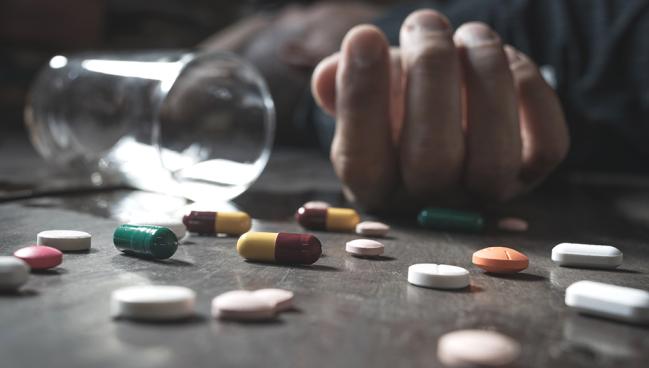AHA Updates Advice for Resuscitation, CV Care After Overdose or Poisons
In addition to opioid overdose, the document tackles other less frequently encountered situations and the role of early ECMO.

The American Heart Association (AHA) has released updated guidance on resuscitation in patients with cardiac arrest or life-threatening toxicity due to poisoning to help physicians navigate these often rare and frenetic clinical situations.
It’s been 13 years since the guidelines have had a comprehensive update, with the opioid crisis in the United States having grown to six times the size it was then, Eric J. Lavonas, MD (Denver Health Emergency Medicine, CO), who led the writing group, told TCTMD.
The update, published September 18, 2023, in Circulation, comes as a result of researchers having gained significant knowledge about how to best use antidotes like naloxone, as well as more advanced therapies like venoarterial extracorporeal membrane oxygenation (VA-ECMO), to save the most critically poisoned patients.
Lavonas said VA-ECMO “can absolutely be lifesaving in patients with cardiogenic shock or arrhythmias from poisoning.” While not without risks, the treatment can stabilize patients until the poison can be removed by the liver or kidneys, or by machine.
“ECMO is available in most major cities, but patient transfers take time,” he added. “Treating physicians need to think about ECMO early and start the process early.”
That can be tricky, because as the document notes, with critical poisonings—aside from opioids—on the decline in recent years, many clinicians don’t frequently encounter these situations.
“Which means when it comes up, they're probably going to be a little rusty,” Lavonas added. “So, just as you would call a cardiologist, I think more clinicians should call a toxicologist when they've got a patient with critical poisoning. We're available [to] help from anywhere in the country by way of a poison center, so even if you're not in a hospital that has a toxicologist, you can always get one [on the phone].”
Information for Clinicians and Lay Rescuers
The focused update, which was created by a multidisciplinary panel and endorsed by the American Academy of Pediatrics, notes that overdose from opioids remains the leading cause of cardiac arrest due to poisoning in North America. The guidelines contain recommendations for basic life support (BLS) and advanced life support in both adult and pediatric patients.
In addition to a discussion of treating opioid overdose with naloxone, the document also addresses the management of patients in cardiac arrest, refractory shock, or imminent threat of cardiac arrest due to poisoning from benzodiazepines, beta-blockers, calcium channel blockers, cocaine, digoxin, sodium channel blockers, and more.
Antidotes and other treatments that are discussed include atropine, calcium, glucagon, hemodialysis, hyperbaric oxygen, and insulin, among others.
“Although many of these treatments are impractical outside of the hospital setting, several can be initiated by emergency medical services, and some (eg, naloxone for opioid overdose) are incorporated into standard BLS training and may be relevant to lay rescuers,” the guideline notes.
Although critical poisoning research is an area where data are scarce, Lavonas said high-dose insulin treatment for patients with cardiogenic shock from beta-blocker and calcium channel blocker poisoning is now well established. The treatment involves doses up to 10 times higher than the amount used to treat diabetic emergencies.
As for IV lipid emulsion for accidental overdose of local anesthetic medications, he said the result is sometimes “nearly miraculous,” at least for bupivacaine, which has led to widespread use. “But we’ve learned to be cautious about using lipids in oral overdoses, when it might increase absorption of poison from the stomach and intestines,” Lavonas added.
Of the 73 recommendations in the guidelines, only two are supported by level of evidence A, highlighting the need for RCTs in the management of critical poisoning and resuscitation.
“It's very hard to study diseases that come up sporadically where you don't have a lot from one center and where you have no warning that a patient is going to present, which is the case with many of these,” Lavonas said.
He added that antidote clinical trials are a huge challenge due to life-threatening poisonings becoming less common, primarily due to the availability of safer medications. Stable, multicenter, multifunctional research networks that are set up to run many studies simultaneously may be the way forward in building a cohesive evidence base.
“What we need to put together are research networks where we have the same group of ten or twenty hospitals and clinicians who can enroll patients in a calcium channel blocker study on Monday, and a patient in a tricyclic antidepressant study on Wednesday,” he said. With established procedures in place, particularly regarding research ethics and informed consent, “then we're ready to enroll lots of patients with lots of different poisoning conditions,” he added.
L.A. McKeown is a Senior Medical Journalist for TCTMD, the Section Editor of CV Team Forum, and Senior Medical…
Read Full BioSources
Lavonas EJ, Akpunonu PD, Arens AM, et al. 2023 American Heart Association focused update on the management of patients with cardiac arrest or life-threatening toxicity due to poisoning: an update to the American Heart Association guidelines for cardiopulmonary resuscitation and emergency cardiovascular care. Circulation. 2023;Epub ahead of print.
Disclosures
- Lavonas reports no relevant conflicts of interest.





Comments